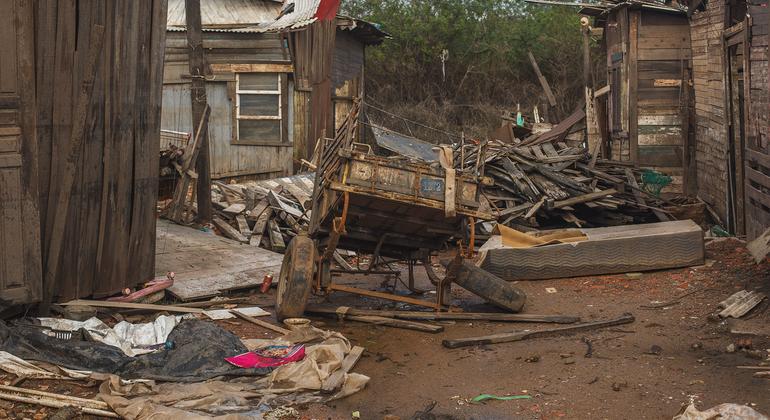U.N. spokesman Stephane Dujarric said Friday that more than six million people, about a third of the country's population, were in need of humanitarian assistance and protection.
“The United Nations and its humanitarian partners are supporting the government's efforts to meet the immediate needs of the people,” he told correspondents in New York.
“Under the humanitarian response plan, aid organisations have so far assisted more than 730,000 people across Burkina Faso in 2024. This is a good start, but only 19 per cent of the 3.8 million people we aim to reach,” he added.
But halfway through the year, the $935 million humanitarian response plan for 2024 is just $157 million, or just 17 percent funded.
Once fully funded, the plan aims to reach around 3.8 million of the most vulnerable people, including women, children and people with disabilities.
A multifaceted crisis
Climate-induced disasters combined with a dramatic deterioration in the security situation have created a complex, multifaceted crisis in the landlocked West African country.
Between November last year and April, some 1,800 people were reported killed in Burkina Faso by both armed groups and the state.
In one particularly horrifying incident, more than 220 civilians, including 56 children, were reportedly killed by uniformed soldiers in two northern villages on a single day in late February.
The country has been under military rule since the start of 2022 amid a militant uprising that has sparked a series of coups and counter-coups.
Devastating floods in southern Brazil last month have killed at least 170 people, forced more than 600,000 to evacuate, and affected a total of approximately 2.39 million people.
Those affected include 43,000 refugees and others in need of international protection, including Venezuelans, Haitians and Cubans, according to the United Nations High Commissioner for Refugees (UNHCR), which warned on Friday that devastating weather and disasters have displaced communities, forcing them to start again from scratch.
With climate disasters expected to increase in frequency, intensity and scale, Andrew Harper, UNHCR's special adviser on climate change, called for governments to include refugees and other displaced people in social security systems.
He said there was also a desperate need for risk mitigation, recovery, emergency response and adaptation plans.
Harper explained that devastating floods, earthquakes, cyclones, storms and heat waves are devastating communities on the move in Africa, the Americas, Asia and beyond, with no end in sight.
Focus on Africa
He added that hundreds of thousands of people in East Africa and the Great Lakes region are still suffering the severe effects of the devastating floods that hit the region in April and May this year.
And in the worst-hit countries – Burundi, Ethiopia, Kenya, Rwanda and Somalia – many refugees' homes have been destroyed and critical infrastructure damaged.
Harper also warned of a high risk of flooding in Sudan and South Sudan, where heavy seasonal rains are battering areas home to thousands of people who have fled a year of deadly conflict.
UNHCR officials also highlighted the deep vulnerability of Chad, which has hosted 600,000 Sudanese refugees since the start of the war, but now heavy rains have damaged fragile refugee shelters and infrastructure in the east.
With the situation expected to worsen throughout the year, UNHCR on Friday launched an appeal for almost $40 million to assist and protect 5.6 million refugees, returnees, internally displaced people and local communities in Burundi, Ethiopia, Somalia, Rwanda, South Sudan and Sudan.
Afghan women and girls should attend Doha conference
The United Nations Committee on the Elimination of Discrimination against Women (CEDAW) on Friday expressed “deep concern” at the apparent “exclusion” of women and girls from a UN-sponsored conference on Afghanistan's future, due to begin this weekend in Doha, Qatar.
Because Afghan women are enduring the most serious crisis facing women's rights anywhere in the world, the Committee calls for women's active and direct participation in these discussions.
In a press statement, CEDAW member states said failure to ensure participation would only deepen the silence of Afghan women and girls, who are already facing intensifying rights violations.
“The Committee has repeatedly expressed concern about the worsening situation of Afghan women and girls, causing enormous and irreversible harm to current and future generations,” the statement said.
“Since the Taliban took power in August 2021, women's exclusion from public life has been further entrenched through continued denial of education and employment, restrictions on their movement and limited presence in public spaces.”
The deprivation of power continues
The recent decision by de facto authorities to cut the salaries of women civil servants, who are barred from employment regardless of their experience and qualifications, further reflects deliberate and harmful acts of disempowerment, the Committee stressed.
“Without including Afghan civil society, including women human rights defenders, as meaningful participants in the discussions in Doha, the rights of women and girls will not be adequately considered.”
Member States said excluding women and girls from these discussions would only undermine the credibility and effectiveness of the Doha Conference.
The Committee monitors the implementation of the Convention on the Elimination of All Forms of Discrimination against Women (CEDAW). It is made up of independent human rights experts elected by secret ballot by the States Parties. Committee members are not UN employees and do not receive a salary.



